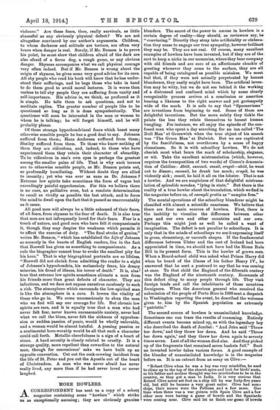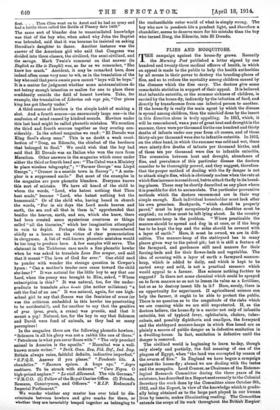MORE HOWLERS.
A CORRESPONDENT has sent us a copy of a school XL magazine containing some " howlers " which strike us as exceptionally amusing ; they are obviously genuine blunders. The secret of the power to amuse in bowlers is a certain degree of reality—they should, as reviewers say, be convincing." Directly they stray into artificiality or elabora- tion they cease to engage our true sympathy, however brilliant they may be. They are not real. Of course, many excellent examples of bowlers have been invented, but if they are of the sort to keep a niche in our memories, where they bear company with old friends and are sure of an affectionate chuckle of greeting whenever they come to the surface, they are all capable of being catalogued as possible mistakes. We must feel that, if they were not actually perpetrated by honest blunderers, they easily might have been. The artificial inven- tion may be witty, but we do not see behind it the working of a distressed and confused mind which by some clearly recognizable process arrives at a conclusion or assertion bearing a likeness to the right answer and yet grotesquely wide of the mark. It is safe to say that "Spoonerisms" are inventions from beginning to end. Some of them are delightful inventions. But the more subtly they tickle the palate the less they relate themselves to honest human bungling. For instance, we all enjoy the episode of the con- fused man who spent a day searching for an inn called ' The Dull Man' at Greenwich when the true object of his search was ' The Green Man' at Dulwich. But we are captivated by the fancifulness, not overthrown by a sense of happy clumsiness. So it is with schoolboy howlers. We do not cherish most what bears the mark of scholarship, elegance, or wit. Take the excellent mistranslation (which, however, requires the transposition of two words) of Cicero's denuncia- tion of Catiline AWE, excessit, evasit, erupit—abiit, he went out to dinner ; exeessit, he drank too much; erupit, he was violently sick ; evasit, he laid it all on the lobster. That is not a howler. And we are suspicious of that delightful mistrans- lation of splendide mendaz, "lying in state." But there is the reality of a true howler about the translation, which we find in the magazine before us, of exempli grafia as " samples free."
The mental operations of the schoolboy blunderer might be classified with almost a scientific exactness. We believe that there are four main sources of bowlers. First, there is the inability to visualize the difference between other ages and our own and other countries and our own. Perhaps this might just as well be called a want of imagination. The defect is not peculiar to schoolboys. It is only that in the minds of schoolboys we see it expressing itself in gross, elementary, or uncouth shapes. If the fundamental difference between Ulster and the rest of Ireland had been appreciated in time, we should not have had the Home Rale Bill in its present form. This is the howler of grown men. When a Board-school child was asked what Prince Harry did when he beard of the illness of his father Henry IV., he answered that he sent a postcard to say that he was coming at once. To that child the England of the fifteenth century was the England of the nineteenth century. Remnants of this defect cling to many people through life. They 'visit foreign lands and call the inhabitants of those countries foreigners. When the American general who received the submission of the people of Porto Rico in 1898 sent a despatch to Washington reporting the event, he described the welcome given to, him by the Spanish population as extremely " patriotic."
The second source of bowlers is unassimilated knowledge. Sometimes one can trace the results of cramming. Entirely different events become mixed up, as with the legendary boy who described the death of Jezebel : "And Jehu said Throw her down,' and they threw her down. And he said 'Throw her down again,' and they threw her down again to seventy times seven. Last of all the woman died also. And they picked up of the fragments that remained seven baskets full." Such an invented howler takes various forms. A good example of the blunder of unassimilated knowledge is in the magazine before us. It is an extract from an essay on Clive :—
"Robert Clive when he was a boy was very miachifua, he used to clime up to the top of the church spire and look for birds nests, so his father and mother thought was too mischiefons to be in the country, so they got a man to India. It is very curious that Robert Clive never set foot on a ship till he was forty-five years old, but still he became a very great sailor. Clive had sums ships, their names were the Pellican and a few more. Oaa time when there was a war goinon with Spain Clive and a few- other men were having a game of bowels and the Spaniard.. were coining near. Clive said let us finish our game of bowels first.. . . Then Clive went on to Arcot and he had an army and had a battle there called the Battle of Plessey date 1469."
The same sort of blunder due to unassimilated knowledge was that of the boy who, when asked why John the Baptist was beheaded, said that it was because he insisted on asking Herodias's daughter to dance. Another instance was the answer of the American girl who said that Congress was divided into three classes, the civilized, the semi-civilized, and the savage. Mark Twain's comment on that answer (in English as She is Taught) was, so far as we remember, " She knew too mach." Accident, it may be remarked here, does indeed often come very near to wit, as in the translation of the boy who said thatpuris omnia pure meant " boys will be boys." It is a matter for judgment whether some miatranslations do not betray enough intention or malice for one to place them confidently, outside the field of honest howlers. Take, for example, the translation of Liberian sub rege pie, "Our pious king has got liberty under."
A third source of howlers is the simple habit of making a shot. And a fourth source—an enormously large one—is the confusion of mind caused by kindred sounds. Howlers under this last head might be called phonetic mistakes. We mention the third and fourth sources together as they overlap con- siderably.. In the school magazine we read : "El Dorado was King Saul's sheep man." This is no doubt a weak recol- lection of "Doeg, an Edomite, the ehiefest of the herdmen that belonged to SauL" We could wish that the boy had said that El Dorado was an Italian who won the race from Marathon. Other answers in the magazine which come under either the third or fourth bead are: " The Cabal was a Ministry to place wireless telegraphy," ; "'Farmer George' was Lloyd George"; "Cromer is a seaside town in Surrey"; "A meta- phor ia a suppressed smile." But most of the examples in the magazine are pure phonetic blunders. Everyone knows this sort of mistake. We have all heard of the child to whom the words, "Lord, who hatest nothing that Thou Last made," became "Lord, who hatest nothing but the housemaid." Or of the child who, having heard in church the words, " For in six days the Lord made heaven and earth, the sea and all that in them is," apprehended that besides the heaven, earth, and sea, which she knew, there bad been created some mysterious creatures or things called " all the tinomies," which her imagination attempted in vain to depict. Perhaps this is to be remembered chiefly as a lesson on the virtue of clear pronunciation in clergymen. A list of well-known phonetic mistakes would be too long to produce here. A few samples will serve. The claimant in the Tichborne case made a fine phonetic howler when he was asked to translate Laus Dee semper, and said that it meant "The laws of God for ever." One child used to ponder with wonder the strange question in Cowper's hymn : " Can a mother's tender care cease toward the child she-bear?" It was natural for the little boy to say that our Lord, when the penny was brought to Him, asked, " Whose subscription is this ? " It was natural, too, for the under- graduate to translate akar Orodr (the nether millstone) "a colt the foal of an ass." It was natural, again, for one high- school girl to say that Seneca was the feminine of sewn (or was the criticism embedded in this howler too penetrating to be accidental P), and for another to say that the genitive of grus (grus, grids, a crane) was gruntie, and that it meant a pig! Natural, too, for the boy to say that Solomon and David were fond of animals, as they had so many porcupines!
In the magazine there are the following phonetic howlers "Solomon in all his glory was not a rabbit like one of these." " Petroleum is what you cover floors with." " The only pouched animal in America is the apostle." " Hannibal was a well- known music writer." "Brill. Omn. Rex, Fla Def., Ind. Imp. Britain always rains, faithful definite, indicative imperfect." "S.P.Q.R. Answer if you please." " Pendente life. A chandelier." "Examen opium. A huge ape." "Aegre sustinere. To be struck with sickness." "Care Nepos. 0 high-priced nephew." "Le Weil Allemand. The vile German." " F.R.0.0. (1) Fellow of the Royal Canine Office. (2) Friends, Romans, Countrymen, and Officers." "R.I.P. Redmond's Imperial Parliament."
We wonder whether any master has ever tried to dis- criminate between howlers and give marks for them, or whether they are invariably heaped together as belonging- to the unclassifiable outer world of what is simply_wrong. The boy who saw in pendente lite a pendent light, and therefore a chandelier, seems to deserve more for his mistake than the boy who turned Doeg, the Edomite, into El Dorado.











































 Previous page
Previous page